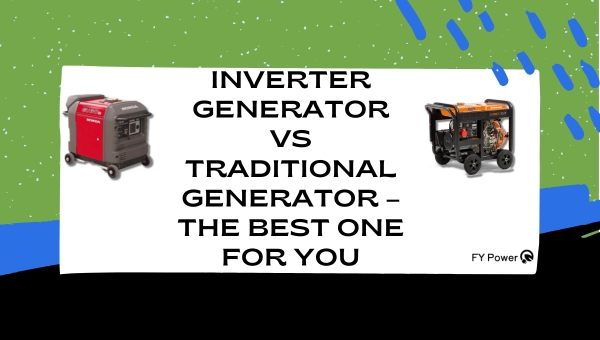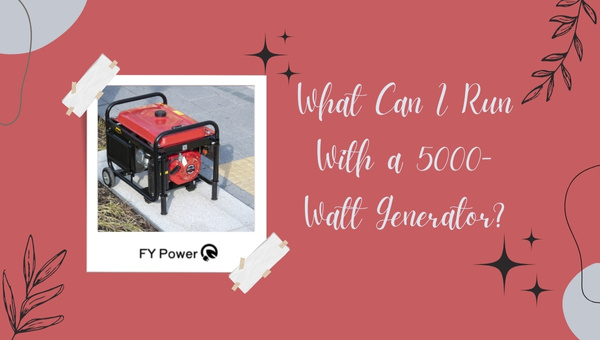Remember the days of lugging around heavy, gas-guzzling traditional generators just to power your outdoor adventures? Well, you can kiss them goodbye. Welcome to the era of inverter generators. These modern marvels are reshaping our approach to portable power, offering a more efficient and user-friendly alternative to their bulky predecessors.
This article, Inverter Generator vs. Traditional Generator, will delve into the technicalities of both types of generators – traditional and inverter, dissecting how each works under the hood. We’ll highlight key differences between them, scrutinize the pros and cons from an analytical perspective, and equip you with enough knowledge to determine which one is best suited for your needs.
If you value freedom in choosing your source of mobile power without compromising on efficiency or convenience, this guide is tailor-made for you. So buckle up as we embark on a journey into the world of generators – exploring old favorites and new contenders alike.

Key Takeaways
- Inverter generators are a more efficient and user-friendly alternative to traditional generators.
- Inverter generators are known for their durability, eco-friendliness, efficiency, and portability.
- Traditional generators offer higher power output and longer run times.
- The choice between inverter generators and traditional generators should be based on individual needs and circumstances.
What Is a Traditional Generator and How Does It Work?
You’re probably wondering about the advantages that come with owning a traditional generator, right?
Well, conventional generators offer notable benefits such as higher power output and longer run times. They can be your ideal choice for heavy-duty tasks due to their robust design and capacity to handle significant loads consistently over extended periods – all characteristics that require a thorough understanding and analytical consideration before making an informed decision.
Benefits of a Traditional Generator
While they might not be as modern, there’s a lot to love about traditional generators. Firstly, these devices are known for their longevity. A well-maintained generator has an impressive lifespan, often outliving the latest tech gadgets.
- Generator Lifespan: Traditional generators tend to last longer compared to inverter types due to their robust construction and lower running speeds.
- Operational Safety: These units come with built-in safety features like circuit breakers and cooling systems that prevent overheating or power surges.
- Power Output: They can generate a significant amount of power, which is ideal for running multiple appliances simultaneously during outages.
Remember, freedom lies in choice; opting for a traditional generator could mean enjoying long-term service and peace of mind regarding operational safety. It’s all about identifying what best fits your needs!
What Is an Inverter Generator and How Does It Work?
An inverter generator is a type of generator that produces more clean and high-quality power compared to conventional generators. Here’s a general breakdown of how an inverter generator works:
- Fuel Source and Initial Power Production: Like any other generator, an inverter generator starts by producing AC (Alternating Current) electricity. This is typically fueled by gasoline, diesel, or propane. When the engine runs, it turns an alternator to generate AC electricity.
- Conversion to DC Power: The initial power produced is raw and needs to be conditioned before it can be used. In a conventional generator, this raw power would be delivered directly. However, an inverter generator takes an extra step by first converting this AC electricity into DC (Direct Current).
- Inversion Back to AC Power: After the electricity is converted to DC, the ‘inverter’ part of the generator then ‘inverts’ this DC electricity back into AC power.
- Power Smoothing and Cleaning: The AC power that’s produced by the inverter is ‘clean’ and of a much more consistent voltage and frequency. This power is safe for sensitive electronics, such as computers and televisions, which may be damaged by the fluctuating power that a regular generator produces.
So, in summary, an inverter generator works by creating AC electricity, converting it to DC, and then inverting it back into clean, consistent, and high-quality AC power.
Benefits of an Inverter Generator
Don’t count your chickens before they hatch; it’s important to consider the advantages of an inverter generator before making a decision. When you’re seeking freedom from traditional power sources, this technology could be your ticket.
- Inverter Durability: Inverter generators are known for their robustness and longevity. They can withstand frequent use without succumbing to wear and tear.
- Eco-friendliness: Unlike conventional generators, inverters produce less noise and emissions – a win for both you and the environment.
- Efficiency: Inverters adjust their engine speed according to power demand, saving fuel and reducing running costs.
- Portability: These units are generally smaller and lighter than traditional generators, making them easier to transport.
In conclusion, an inverter generator brings durability, eco-friendly operation, efficiency, and portability into play – all factors that amplify your independence when it comes to power generation.
Key Differences Between Inverter Generators and Traditional Generators
As you delve deeper into the world of generators, it’s crucial to understand the key distinctions between inverter generators and traditional ones.
These differences manifest in various aspects such as size, weight, noise level, fuel efficiency, and maintenance requirements.
In order to make an informed decision that balances your power needs with practical considerations, you’ll need a thorough analysis of these factors.
Size
When it comes to size, inverter generators typically take the cake for being more compact and portable than their traditional counterparts. This is a significant factor when considering generator aesthetics and the overall inverter lifespan.
- Lightweight: Inverter generators are lighter, making them easier to transport and store.
- Compactness: Their small size doesn’t compromise power output.
- Portability: Handy handles or wheels provide easy maneuverability.
- Less Space Occupied: The reduced footprint offers flexibility of placement, which is essential for those who value freedom of space.
- Longevity: Smaller parts result in less wear over time, potentially extending the inverter’s lifespan.
So if you’re after an aesthetically pleasing, durable solution that won’t hog your space and can be moved with ease, an inverter generator may be your best bet.
Weight
Believe it or not, the weight of these power-packed machines is lighter than a feather – well, not exactly, but you get the point! The weight significance of your choice between an inverter generator and a traditional one can’t be underestimated.
In terms of weight comparison, traditional generators are heavy-duty appliances that can weigh up to several hundred pounds. In contrast, most inverter generators are designed to be compact and lightweight, often weighing less than 50 pounds. This makes them more portable and easier for you to move around.
However, remember that their lightweight comes at a cost: they might not offer the same power capacity as their heavier counterparts. So if portability is essential for your freedom-loving spirit, an inverter generator could be your best bet.
Noise Level
If you’re craving some peace and quiet, then the noise level of your power source is definitely something to consider. Traditional generators are known for their loud operation, which might disturb your tranquility or violate local noise regulations.
- Decibel Levels: Inverter generators typically operate between 50-60 decibels (dB), while traditional ones can reach up to 80 dB. That’s like comparing a conversation at home to city traffic.
- Soundproofing Techniques: Although you can apply soundproofing techniques, they may not significantly reduce the noise of a traditional generator.
- Noise Regulation Compliance: Many inverter models comply with the most stringent noise regulations due to their quieter operation.
- Freedom of Location: The lower decibel count of inverters gives you more freedom regarding where you can use them without causing a disturbance.
Choose wisely, as these factors significantly impact your experience and freedom!
Fuel Efficiency
Let’s dive into the topic of fuel efficiency, a critical factor that can make or break your decision on which power source to opt for. Traditional generators operate at a constant speed regardless of what you’re powering, using more fuel than necessary. In contrast, inverter generators adjust their output based on demand, resulting in better fuel efficiency.
Consider this comparison:
| Specs | Traditional Generator | Inverter Generator |
|---|---|---|
| Fuel Types | Limited Options | Greater Variety |
| Fuel Efficiency | Moderate at Constant Speed | High – Adjusts to Demand |
| Emission Control | Less Efficient | More Efficient |
Inverter generators are also equipped with better emission control systems making them environmentally friendly. They accept various fuel types giving you more freedom and flexibility. Thus, if you value efficient use of resources and lower emissions, an inverter generator is a superior choice.
Also Read: Choosing The Best Oil For The Generator: Shopping Guide & Tips
Maintenance
Leaving the calculation of fuel efficiency behind, let’s move on to another pivotal point – maintenance. The type of generator you choose has a direct impact on your freedom from cumbersome and time-consuming upkeep procedures.
- Routine Cleaning: Inverter generators typically require less routine cleaning than traditional ones due to their sophisticated design and superior technology.
- Spare Parts: Traditional generators might need more frequent replacement of spare parts, which might restrain your freedom due to added costs and efforts.
- Technical Know-How: While both types necessitate basic mechanical knowledge, inverter generators are equipped with self-diagnostic capabilities offering easier troubleshooting.
- Frequency of Maintenance: Traditional models generally demand more regular check-ups, tightening your schedule.
In essence, if convenience appeals to you as integral to your sense of liberty, an inverter generator provides a better balance between performance and maintenance ease.
Portability
Think about the times you’ve struggled to lug around a heavy piece of equipment – not a pleasant memory, right? When choosing between an inverter generator and a traditional generator, portability is a significant factor.
Inverter generators usually have a compact design that maximizes travel convenience. They’re lighter and easier to carry around whether you’re heading out camping or need emergency power during an outage.
Meanwhile, traditional generators are bulkier due to their larger engines and fuel tanks. This makes them less ideal if freedom of movement is crucial for you. On the other hand, they’re perfect for stationary use where high power output is required.
So, when it comes to portability, inverter generators definitely hold the upper hand. Your choice depends on your specific needs and how much value you place on mobility versus power output.
Power Output
When it comes to raw power, bigger is indeed better. Imagine running a whole construction site with multiple heavy-duty machines – a scenario where a petite, portable power source just won’t cut it.
Now consider the output performance of traditional generators: they’re designed for such demanding situations. These beasts can generate massive amounts of power – enough to keep your entire worksite humming along without missing a beat.
In contrast, inverter generators might not offer that level of voltage stability. They’re perfect for small-scale use like camping or tailgate parties but may falter under a load of heavier equipment.
So when you crave freedom from power restrictions on your job site or at home during an outage, remember this comparison and make the choice that best suits your needs.
Price
Consider the price tag before making any purchase because, despite their differences in power output, both types of generators can put a serious dent in your wallet. When comparing prices between traditional and inverter generators, there are several budget considerations to keep in mind.
- Traditional Generators: Typically, these models are less expensive upfront. However, they require frequent maintenance, which could add up over time.
- Inverter Generators: These tend to come with a higher initial cost but offer savings down the line due to lower fuel consumption and less maintenance.
- Long-term Costs: Remember to factor in the ongoing costs of fuel and possible repairs.
Price comparisons show that both options have their financial pros and cons. The best choice depends on your specific needs and how much you’re willing to invest initially versus long-term for sustained energy freedom.
What are the Pros of Inverter Generators over Traditional Generators?
Inverter generators certainly outshine their traditional counterparts in several key areas, making them a compelling choice for many users.
One such area is inverter longevity. With an advanced technology design, inverter generators can last longer than regular generators. The electronic circuitry is more efficient and less prone to wear and tear, thereby extending the life of your equipment.
Another advantage lies within the eco-throttle mechanisms found in most modern inverters. This feature adjusts the engine speed to only produce the amount of power needed for the load being applied. Consequently, this results in in inefficient fuel consumption and minimizes noise levels during operation.
Moreover, you’ll appreciate how these generators produce a cleaner and smoother electrical output which is essential when powering sensitive devices like laptops or televisions. This better sine wave output reduces the chances of damaging your appliances due to voltage fluctuations.
So if you’re seeking a generator that offers durability while upholding respect for nature through efficient fuel use and has an added bonus of quiet operation – then an inverter generator might just be what you need. Remember, investing wisely now could save you from future headaches!
Might Be Helpful: 10+ Tips To Choose The Best Generator For Construction Sites
What are the Cons of Inverter Generators over Traditional Generators?
While there are clear advantages of inverter generators, let’s not overlook the potential drawbacks. Understanding these can help you make an informed decision about what best suits your power needs.
A primary concern with inverter generators is their durability. Unlike traditional generators with a robust and rugged design, inverters tend to be more delicate. This fragility may undermine its longevity, especially if it’s exposed to harsh conditions or mishandled frequently.
Another aspect worth considering is startup speed. Traditional generators typically have a faster startup time compared to their inverter counterparts. In situations where instant power is crucial, this delay might pose a problem.
Furthermore, the sophisticated electronics within inverters make them prone to costly repairs should anything go wrong. Plus, they often come with higher purchase costs than conventional models due to their advanced technology and features.
You cherish freedom and having control over your choices, therefore, weigh the pros against these cons carefully before settling on one type or another. Remember that what works for someone else might not necessarily work for you, depending on your specific needs and circumstances.
So while inverters offer technological advancements and increased efficiency, keep in mind these potential downsides when assessing the overall value proposition.
Inverter Generator vs Traditional Generator Table
Navigating the world of portable power can be a bit tricky, but don’t fret—we’re here to help you figure out what’s most suitable for your needs. Your choice between an inverter generator and a traditional generator will largely depend on two key factors: Generator Durability and Usage Scenarios.
To evoke an emotional response, let’s consider these aspects in the following table:
| Aspect | Inverter Generators | Traditional Generators |
|---|---|---|
| Durability | High durability due to fewer moving parts, but sensitive to rough handling. | Extremely durable, able to withstand rigorous usage and harsh environments. |
| Home Use | Excellent for sensitive electronics due to clean energy output. | Good for appliances not affected by power surges. |
| Outdoor/Camping | Lightweight design makes it ideal for outdoor activities. | Heavyweight makes it less ideal for frequent movement. |
| Power Outages/Emergencies | Offers limited power supply. | Provides ample power supply during extended blackouts. |
Analyzing this information should make your decision-making process easier. Remember, freedom comes from making informed choices that best fit your unique situation and needs.
Frequently Asked Questions
What is the average lifespan of both inverter generators and traditional generators?
The lifespan of your generator depends on its efficiency and fuel consumption. Typically, inverter generators last 1500-2000 hours, while traditional generators can endure for 10000+ hours with proper maintenance and regular use.
Can both inverter and traditional generators be used in all weather conditions?
Surely, both inverter and traditional generators can be utilized universally, yet weather resistance comparison varies. Typically, traditional types tend to tolerate tough conditions better. Treat the topic of operational noise levels separately, though.
How often do I need to maintain my inverter or traditional generator?
Your generator’s maintenance frequency depends on its fuel efficiency and noise levels. High-efficiency units require less upkeep, but noisy ones may need more frequent checkups. Ensure your freedom by maintaining it regularly for optimal performance.
What safety precautions should I take when using an inverter generator compared to a traditional generator?
Cross all your t’s and dot your i’s with generator safety. Ensure proper generator placement away from living spaces. Store fuel safely in approved containers. Remember, freedom means responsibility – don’t compromise on safety measures.
Are there specific brands of inverters or traditional generators that are recommended over others?
Yes, brands matter. For lower generator noise levels, Honda’s inverter generators are recommended. On the other hand, Generac’s traditional generators excel in fuel efficiency comparison. Always choose based on your specific needs and freedom desires.
Conclusion
In the end, it’s your call. You’ve got to weigh the pros and cons, like a juggler with balls in the air. Remember, an inverter generator offers efficiency and quiet operation but may pinch your pocket.
On the other hand, a traditional generator is hardy and cost-effective but could be noisy. Analyze your needs, and let them guide you to make the right choice between an inverter and a traditional generator.

